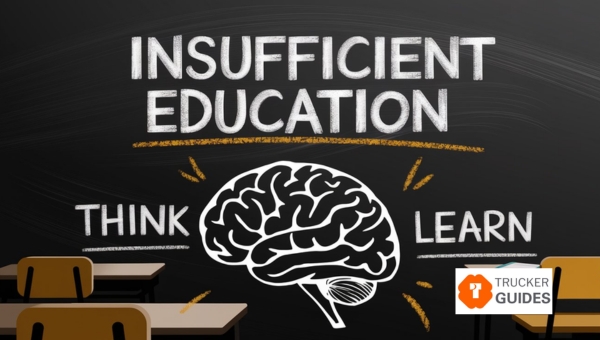30 Major Causes Of Failure [Avoid These Common Mistakes]


Understanding “The 30 Major Causes Of Failure” can be the key to unlocking your full potential. In this article, we’ll delve into the common reasons people struggle, from unfavorable personal factors to poor decision-making.
By recognizing these pitfalls, you can navigate life’s challenges more effectively and set yourself up for success. Let’s dive in and explore how to turn these potential setbacks into stepping stones for a brighter future.
Life’s challenges can often be influenced by personal and environmental factors. These factors can play a significant role in one’s success or failure.

Let’s look closely at how certain unfavorable conditions might shape our outcomes.
When we talk about an unfavorable hereditary background, we’re referring to the genetic traits and conditions passed down from our ancestors. These inherited traits can sometimes pose challenges that might hinder success.
For instance, if one inherits a predisposition to certain health conditions like heart disease or mental health disorders, this can affect their ability to perform at their best.
Genetic factors can influence personality traits such as introversion or anxiety, which might make it harder to navigate social and professional environments.
The environment we grow up in significantly shapes who we become. Unfavorable environmental influences during childhood, such as growing up in a high-stress or abusive household, can have lasting effects on an individual’s ability to succeed.
These early experiences can affect self-esteem, emotional regulation, and cognitive development. For example, children who experience neglect or lack of educational resources may struggle with self-worth and academic achievement later in life.
Exposure to violence or substance abuse can lead to behavioral issues and mental health problems. It’s important to recognize these influences and seek supportive interventions or therapies to mitigate their effects.
Ill health is another significant factor that can impede success. Chronic illnesses, frequent illnesses, or severe health conditions can drain energy, reduce productivity, and limit opportunities.
For example, someone with a chronic illness like diabetes may have to manage their condition daily, impacting their ability to focus entirely on their goals.
Frequent health issues can lead to absenteeism from work or school, causing setbacks in achieving milestones. Moreover, severe health conditions can lead to financial strain due to medical expenses, further complicating one’s path to success.
Life without a clear sense of purpose and ambition can often lead to failure. It’s essential to recognize how these factors play a vital role in shaping one’s success.

Let’s delve into the importance of having a well-defined purpose, and the consequences of lacking ambition.
Having a well-defined purpose in life is like having a map that guides you toward your goals. Without it, you might find yourself wandering aimlessly, unsure of where to direct your efforts.
A clear purpose gives you direction and motivation. It helps you prioritize tasks, make better decisions, and stay focused on what truly matters. For instance, if you know that your purpose is to become a doctor, you will be more inclined to study hard, choose the right courses, and seek relevant experiences.
Ambition is the drive to achieve more than the ordinary. When lacking ambition, individuals often settle for mediocrity, missing out on opportunities to excel. This can lead to a life of unfulfilled potential and regret.
Ambition pushes you to set higher standards for yourself, encouraging continuous growth and improvement. For example, an ambitious student might aim for top grades and scholarships, while a less ambitious one might be content with just passing. The former is likely to open more doors for future success.
Ambition fuels perseverance and resilience, qualities necessary to overcome obstacles and achieve significant milestones. Without it, one might never realize their full capabilities or contribute meaningfully to society.
Education and self-discipline are crucial foundations for success. Deficiencies in these areas can lead to numerous challenges and failures. Education provides the knowledge and skills needed to navigate various aspects of life, from personal decisions to professional endeavors.
Without adequate education, individuals may struggle to find good job opportunities or make informed choices. Self-discipline, on the other hand, is the ability to control impulses and stay focused on long-term goals. It helps you stick to plans, and manage time effectively.
For instance, a person who lacks self-discipline might find it challenging to complete tasks or maintain healthy habits. Together, education and self-discipline empower individuals to pursue and achieve their aspirations, making their absence a significant barrier to success.
Insufficient education can be a significant roadblock on the journey to success. It forms the foundation of our knowledge and skills, which are essential in navigating life’s challenges.

Without a solid educational background, individuals may find it difficult to grasp opportunities or climb the career ladder.
Self-discipline plays a crucial role in achieving success. It’s the ability to push oneself to take action regardless of emotional state or external circumstances. Without self-discipline, even the most educated individuals may struggle to reach their goals.
For instance, consider a student who has all the resources for studying but lacks the self-discipline to use them effectively. They might procrastinate, fail to complete assignments on time, and ultimately perform poorly despite having the potential to excel.
Self-discipline is like a muscle; the more you exercise it, the stronger it becomes. Simple practices like setting clear goals, creating a structured routine, and holding oneself accountable can significantly enhance self-discipline.
Also Read: 8 Best PEO Services for 2024 [Must-Have Professional Help]
Negative behavioral traits can significantly hinder one’s path to success. These traits often manifest in ways that disrupt productivity, diminish motivation, and negatively impact relationships.

While there are many such traits, three stand out as particularly harmful: procrastination, lack of persistence, and a negative personality.
Procrastination is the act of delaying or postponing tasks. It may seem harmless at first, but it can snowball into a major roadblock to success. When we procrastinate, we often end up with a pile of unfinished tasks, leading to stress and poor performance.
Moreover, procrastination often stems from a lack of confidence or fear of failure, which can further impede progress. By addressing procrastination, individuals can improve their time management skills and increase their productivity.
Overcoming procrastination involves setting clear goals, breaking tasks into manageable chunks, and staying disciplined. It’s about taking control of your time and making the most out of every moment.
Persistence is the ability to keep going despite obstacles. Without it, achieving long-term goals becomes nearly impossible. Many successful people attribute their achievements to their unwavering persistence. When faced with challenges, those who lack persistence are quick to give up.
Building persistence involves developing a strong mindset, staying focused on goals, and learning from failures. It’s about pushing through difficulties and not letting setbacks deter you. Persistence is the fuel that keeps the engine of success running, ensuring that you stay on course no matter what.
A negative personality can be a major cause of failure. People with a negative outlook tend to focus on problems rather than solutions, which can lead to a cycle of pessimism and inaction.
This attitude not only affects personal motivation but also impacts relationships with others. Negative individuals often find it hard to collaborate, which can hinder teamwork and collective success.
Cultivating a positive personality involves practicing gratitude, staying optimistic, and focusing on personal growth. By shifting to a positive mindset, individuals can enhance their problem-solving abilities and build stronger connections with others.
Also Read: 15 Ways to Develop Persistence? [Build Resilience and Thrive]
Making decisions and staying focused can be tricky. They are crucial skills for success but often overlooked.

Without good decision-making and focus, achieving goals becomes much harder. Let’s explore how these factors contribute to failure.
A well-defined power of decision is vital for success. When you can’t decide quickly or with confidence, opportunities may slip away. Imagine you have two job offers. Without the ability to decide, you might miss both. Decisiveness helps you seize the moment and make the best of available opportunities.
It also builds trust in others, showing that you are reliable and can handle responsibilities. Practicing decision-making can thus be a game-changer in both personal and professional life.
Being cautious is good, but being overly cautious can hold you back. When you are too careful, you might avoid taking necessary risks. This could mean missing out on big opportunities. For example, not investing in a promising project because of fear can lead to regret.
Balanced risk-taking is essential for growth and progress. By understanding when to take a chance, you can move forward more confidently and achieve your goals without unnecessary delays.
Concentration of effort is focusing all your energy on one task. When you spread yourself too thin, you achieve less. Think of it like trying to juggle too many balls at once—eventually, you’ll drop them. By focusing on one task at a time, you complete it more efficiently and effectively.
Prioritizing tasks and concentrating efforts improves productivity and leads to better results. This way, you ensure that each task gets the attention it deserves, paving the way for success.
Also Read: 10 Best GA4 Alternatives
Social and relational aspects can be tricky, but they play a significant role in achieving success or facing failure. Let’s explore how specific choices and behaviors impact our journey.
The wrong partner in marriage can have a profound impact on one’s life. A mismatched relationship can lead to constant stress, emotional turmoil, and distraction from personal goals. When two people are not on the same page regarding values, ambitions, or lifestyle choices, it creates friction that can drain energy and focus.
This disharmony often spills over into other areas of life, making it difficult to maintain momentum toward success. It’s essential to carefully consider compatibility and shared goals when selecting a life partner to ensure a supportive and nurturing environment.
Selecting the wrong business associates can spell disaster for any venture. The people you partner with in business can significantly influence the direction and success of your enterprise. If your associates lack integrity, competence, or a shared vision, it can lead to conflicts, poor decision-making, and ultimately, failure.
It’s crucial to conduct thorough due diligence when forming business partnerships. Aligning yourself with trustworthy, skilled, and like-minded individuals can create a strong foundation for success and prevent many potential pitfalls.
Cooperation is a fundamental aspect of success in any field. The inability to work well with others can lead to isolation, misunderstandings, and missed opportunities. Whether in a professional setting or personal relationships, effective collaboration fosters innovation, problem-solving, and mutual support.
Developing good communication skills, empathy, and a team-oriented mindset are vital for building successful partnerships and achieving common goals.
A cooperative attitude helps in navigating challenges and enhances the overall productivity and harmony within any group or organization.
Also Read: Business Term Loans [A Guide to Financing Your Growth]
Financial mismanagement can be a major roadblock on the path to success. It’s important to understand how poor financial habits and insufficient capital can hinder progress. We’ll delve into these issues to help you recognize and avoid these pitfalls.
Indiscriminate spending is one of the major causes of financial mismanagement. Picture this: you have a regular income, but at the end of each month, you find yourself wondering where all the money went. This scenario is all too common.
Poor financial habits, like not budgeting or tracking expenses, can lead to a cycle of debt and financial stress. When you spend without considering the consequences, you might end up buying things you don’t need and can’t afford.
This not only affects your bank account but also your peace of mind. To achieve financial stability, it’s crucial to develop good spending habits. This includes creating a budget, keeping track of expenses, and making conscious decisions about where your money goes.
Lack of capital can also be a significant barrier to success. Imagine having a brilliant business idea but not enough funds to bring it to life. This is a common challenge that many entrepreneurs face.
Without sufficient capital, it’s difficult to invest in necessary resources, hire skilled employees, or market your product effectively.
This can hinder growth and lead to failure. Moreover, even if you have a steady income, not having a financial cushion to fall back on in times of need can be risky. Emergencies and unexpected expenses can arise, and without adequate savings, you might find yourself in a tough spot.
To overcome this, it’s important to plan and save diligently. Building an emergency fund, exploring different financing options, and seeking advice from financial experts can help you secure the capital you need.
Also Read: 7 Best Outsourced Accounting Firms in [Our Top Picks]
Negative mindset and emotional states can significantly impact one’s path to success. These states can cloud judgment, hinder decision-making, and create barriers to achieving goals.
Let’s explore some specific aspects of this topic.
Fear is a powerful emotion that can paralyze one’s efforts toward success. The six basic fears include the fear of poverty, criticism, ill health, loss of love, old age, and death. Each of these fears can disrupt daily life, making it difficult to focus on long-term goals.
For instance, the fear of criticism might prevent someone from taking risks or sharing innovative ideas, while the fear of poverty might lead to overly cautious financial decisions. Addressing these fears is crucial.
Understanding and overcoming these fears can empower individuals to move forward with confidence and clarity.
Superstition and prejudice are mental barriers that can derail success. Superstition involves irrational beliefs that can lead to poor decision-making, while prejudice includes preconceived opinions that are not based on reason or actual experience.
These mindsets can prevent individuals from seeing opportunities objectively and hinder personal growth. For example, believing in bad luck might stop someone from pursuing a promising venture, or holding prejudiced views might limit collaboration with diverse and potentially beneficial partners.
Challenging these beliefs and adopting a more open-minded approach can lead to more informed and effective decisions.
Indecision is a major hurdle to success. When individuals are unable to make decisions, they miss out on opportunities and waste valuable time. Indecisiveness often stems from a lack of confidence or fear of making the wrong choice.
This can result in missed deadlines, lost chances, and a general lack of progress. To overcome indecision, it is important to weigh the pros and cons of each option and trust one’s judgment.
Developing decision-making skills and building confidence can lead to more decisive actions and better outcomes in both personal and professional life.
Egotism and vanity can be detrimental to success. Egotism involves an inflated sense of self-importance, while vanity is an excessive focus on one’s appearance or achievements.
These traits can alienate others and create a toxic environment, making it difficult to build strong relationships and collaborate effectively.
For instance, someone who is overly egotistical might dismiss valuable feedback, leading to poor performance. Similarly, a vain person might focus more on superficial aspects rather than substantive achievements.
Cultivating humility and a genuine interest in others can foster better teamwork and lead to more sustainable success.
In the journey of understanding why failure occurs, there are several factors that might not fit neatly into other categories but are crucial to consider.
These miscellaneous factors often play a significant role in determining success or failure. Let’s delve into some of these unique influences.
Uncontrolled sexual urges can lead to distractions and poor decision-making. When these urges are not managed, they often result in behaviors that can disrupt personal and professional life.
This may cause individuals to lose focus on their goals and responsibilities, which is essential for success. It’s important to channel this energy positively, perhaps into hobbies or work, to maintain a balanced and productive life.
The desire to gain without effort is a common pitfall that leads to failure. This mindset often results in taking shortcuts that compromise quality and integrity. People with this mentality may avoid hard work and seek quick wins instead.
This not only hampers personal growth but also tarnishes one’s reputation. Success typically requires dedication and effort, and without these, one’s achievements may be short-lived or non-existent.
Choosing the wrong career path can have a profound impact on an individual’s success. When one’s skills and interests do not align with their job, it can lead to dissatisfaction and poor performance.
This mismatch can result in a lack of motivation and reduced productivity. It’s important to assess personal strengths and passions when selecting a vocation to ensure long-term success and fulfillment.
Incompetence, or the inability to perform tasks effectively, is a major barrier to success. It often stems from a lack of skills, knowledge, or experience necessary for a particular role.
This can lead to mistakes, missed opportunities, and a damaged reputation. Continuous learning and skill development are essential to overcome incompetence and achieve success.
Gaining power without putting in the effort can be detrimental. When power or authority is handed to someone without them earning it, they may lack the necessary experience and respect to lead effectively.
This can result in poor decision-making and a lack of credibility. True leadership and success are built on a foundation of hard work and earned respect.
Dishonesty can severely impact one’s path to success. When individuals choose to deceive others, they risk losing trust and damaging their reputation.
Trust is a crucial component of any relationship, whether personal or professional. Once lost, it can be incredibly difficult to regain. Being honest and transparent is essential for long-term success and credibility.
Relying on guesses rather than critical thinking can lead to poor decisions and failure. Critical thinking involves analyzing information and making informed decisions based on facts and logic.
When individuals guess instead of thinking, they are more likely to make errors and overlook important details. Developing strong critical thinking skills is crucial for making sound decisions and achieving success.
Enthusiasm is a driving force behind success. Without it, individuals may struggle to stay motivated and committed to their goals. A lack of enthusiasm can lead to a lack of effort, resulting in mediocre outcomes.
Cultivating a passion for one’s work and maintaining a positive attitude can help sustain motivation and drive, leading to greater success.
The myriad causes of failure provide invaluable lessons for personal growth and success. By identifying and addressing these challenges, we can pave a clearer path toward our goals. Whether it’s overcoming unfavorable conditions, cultivating ambition, or improving decision-making skills, each step taken is a move closer to success.
Remember, recognizing these factors is the first step in turning failure into opportunity. If you found this insightful, explore more of our informative blogs to continue your journey of learning and self-improvement!